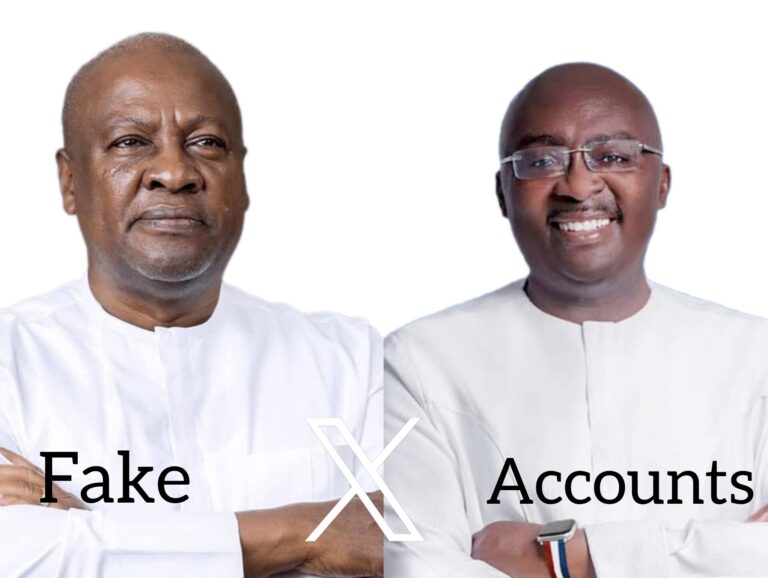[mc4wp_form id=”2320″]
171 Phony X (Twitter) accounts meddling in Ghana’s election
-
November 18, 2024
- Posted by: Evans Asare

171 Phony X (Twitter) accounts meddling in Ghana’s election as Ghana approaches its presidential election on December 7, researchers have uncovered a network of 171 bot accounts on X that use ChatGPT to write posts favorable to the incumbent political party, the New Patriotic Party (NPP).
AI-Driven Political Bots Target Ghana’s 2024 Election: How to Spot and Protect Yourself from Influence Campaigns
As Ghana’s 2024 general election approaches, the political landscape is increasingly being shaped not just by traditional campaign efforts, but by digital influence campaigns. New research conducted by NewsGuard, a company that monitors online content credibility, has uncovered a network of bot accounts that have been actively promoting NPP (New Patriotic Party) candidate Mahamudu Bawumia. These bots have been using artificial intelligence (AI) to generate content and amplify right-wing political talking points, raising concerns about the role of AI in modern political campaigns and election integrity.
In this article, we’ll dive into how these bots operate, their impact on Ghana’s political discourse, and the measures you can take to protect yourself from falling victim to such influence campaigns.
1. AI Bots Pushing Pro-Bawumia Messaging and NPP Slogans
In the buildup to the election, bot accounts have been consistently pushing pro-Bawumia and pro-NPP messages. These bots often use popular hashtags like #Bawumia2024, #NPP, and the party’s well-known slogan, #ItIsPossible, to promote Bawumia’s candidacy and policies. Active since February 2024, these accounts have been relentless in amplifying Bawumia’s message across social media platforms.
For instance, one AI-generated post from September read:
“Admiring Dr. Bawumia’s commitment to transforming Ghana. Dr. Bawumia has made a profound impact on our national policies and driven our progress. #Bawumia2024 #NPP.
Interestingly, these bots don’t just support Bawumia; they also attack his main rival, John Mahama from the National Democratic Congress (NDC). Using derogatory hashtags like #mahamaisaliar and #DrunkmaniMahama, the bots accuse Mahama of being a drunkard, a claim that Mahama has vehemently denied. The goal seems clear—discredit Mahama while promoting Bawumia’s campaign.
How to Protect Yourself:
- Be cautious of posts that seem overly repetitive or lack authenticity. Bots often produce a high volume of posts with minimal variation.
- Avoid engaging with accounts that have suspicious profiles, such as those with generic names and AI-generated images.
- Refrain from interacting with posts that seem designed to spread hate or misinformation.
2. The Use of AI in Political Bots: A Growing Threat to Election Integrity
The integration of AI technology, specifically ChatGPT, into political influence campaigns is becoming more prevalent. NewsGuard’s research utilized tools from Pangram Labs to analyze content from the 171 bot accounts, and their findings were clear: the content was highly likely to have been generated by AI.
These bot accounts post at regular and predictable intervals, sometimes posting 10 or more times per day. Their patterns of activity are highly regimented, often peaking during certain times of the day, typically between 8 a.m. and 6 p.m. in Ghana. The automated nature of posting and the consistent timing indicate that algorithms, not humans, operate the accounts.
How to Protect Yourself:
- Pay attention to posts that seem mechanical or lack genuine engagement. The repetition and automation of these posts can be a red flag.
- Always verify political information through official, credible sources before engaging with or sharing it.
- Be wary of social media accounts with a high frequency of posts that lack original or thoughtful commentary.
3. Political Influence Through Fake Accounts: A Pattern on X (formerly Twitter)
Social media platforms, particularly X (formerly Twitter), have become major battlegrounds for political influence. With Elon Musk’s acquisition of X, content moderation has dramatically decreased, leading to greater opportunities for manipulation. According to Dimitris Dimitriadis, NewsGuard’s director of research, the decline in moderation has allowed political bots to flourish, with minimal intervention from the platform.
Since Musk’s takeover in 2022, X has seen a rise in misleading content and viral disinformation, often coming from verified accounts that are given greater prominence on the platform. A recent survey by NewsGuard revealed that one-quarter of X users believe verified accounts are more trustworthy than non-verified ones. This verification process has become a tool for spreading false narratives, making the platform more prone to manipulation by bad actors.
How to Protect Yourself:
- Verify the sources of information you encounter—especially if the content seems sensational or unverified.
- Be skeptical of viral posts that seem designed to provoke an emotional response.
- Use fact-checking tools to verify the accuracy of posts before sharing or engaging with them.
4. The Role of ChatGPT in Influencing Political Discourse
AI tools like ChatGPT are being increasingly employed by political influence networks to create vast quantities of content aimed at swaying public opinion. As Dimitriadis explained, these tools allow bad actors to produce content at scale, making it easier to flood social media platforms with tailored political messages.
The NewsGuard report indicates that the AI-driven bot network in Ghana is likely the first of its kind to use AI to influence a national election. While the bots don’t seem to be introducing entirely new political ideas, they play a major role in amplifying existing narratives—particularly pro-Bawumia and anti-Mahama rhetoric.
How to Protect Yourself:
- Educate yourself on the impact of AI in online content creation. Knowing that bots may be behind certain posts can help you better navigate digital influence campaigns.
- Support campaigns that advocate for digital literacy and raise awareness about the growing role of AI in political manipulation.
- Be critical of content that seems overly repetitive or overly aligned with specific political narratives, especially when it lacks substance.
5. The Risks of Reduced Content Moderation on X (Twitter)
Since Elon Musk’s acquisition of X, content moderation on the platform has drastically diminished. Dimitriadis pointed out that this reduction in oversight has paved the way for malicious actors to exploit the platform for political manipulation. By firing most of X’s content moderators and trust and safety engineers, the company has left a significant gap in its ability to identify and prevent influence operations.
The decline in moderation has allowed AI-driven bots to spread disinformation with little resistance. NewsGuard’s research has confirmed that these bots have been used in Ghana’s political context to amplify partisan messages and attack opposition candidates.
How to Protect Yourself:
- Advocate for stronger content moderation policies on social media platforms to limit the spread of misinformation.
- Stay informed about how platforms like X handle misinformation and AI-driven content.
- Share information responsibly by verifying its accuracy before spreading it online.
Conclusion: Guarding Against AI-Driven Misinformation in Ghana’s 2024 Election
As Ghana enters the final stages of the 2024 election season, the impact of AI-driven bots on political discourse cannot be ignored. These bots flood social media with targeted political messaging, often blurring the lines between authentic discourse and automated manipulation.
To protect yourself from these influence campaigns, it’s crucial to remain vigilant and question the sources of information you encounter online. Take the time to verify content, avoid engaging with suspicious accounts, and use trusted channels to stay informed. In an era of digital manipulation, digital literacy is key to ensuring a fair and transparent political process.
By understanding how these AI-driven campaigns work and applying critical thinking, we can all contribute to safeguarding the democratic process and ensuring that the 2024 Ghana election remains free from external manipulation.

does tadalafil lower blood pressure TadalAccess cialis back pain
https://tadalaccess.com/# where can i buy cialis over the counter
difference between tadalafil and sildenafil: TadalAccess – cialis ingredients
cialis genetic: Tadal Access – buy a kilo of tadalafil powder
typical cialis prescription strength buy cialis in toronto or what is the generic name for cialis
http://www.google.co.id/url?sa=t&source=web&cd=2&sqi=2&ved=0ccqqfjab&url=http://tadalaccess.com&rct=j&q=free cialis logo
recreational cialis cialis one a day with dapoxetine canada and when will cialis become generic cialis from mexico